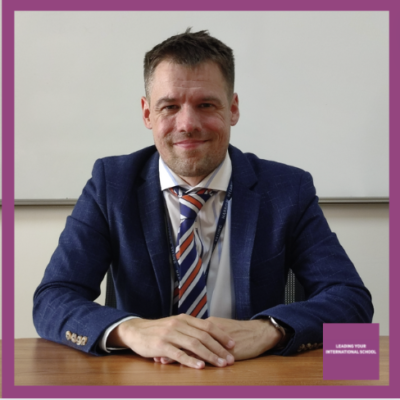by Simon Probert
Only through Time, Time is Conquered*
I’ve been reflecting recently on my journey through international education, the different schools and communities I have worked within, and ways in which international education is different to education systems in local contexts. Through that time, I have become aware of ways I have changed and grown professionally and personally, evolving as I have developed as an educator to adapt to the contexts and communities in which I have found myself. Like our students, as international educators we have multiple places of home, growing and learning with each new context we come to. There is an idiom in Chinese 叶落归根 – ‘As we age we go back to our roots’ – an understanding that reflection on where we have come from, our values, beliefs and experiences, are constantly in resonance with the directions we go as we move forward in time and space.
I suspect COVID-19 will become a memory of a moment when time stood still, a forced moment of reflection, a temporary lull (even more so for those of us in China who were confined within the borders for 4 years). I think for me it will become a stake in the ground as I grow through time, a moment I became aware of the distance I had come from my homeland (literally and metaphorically), an understanding that moving forward my own sense of multiple identities and homelands was a good place to start in terms of reflecting on the work we are doing with our students.
The Age of Identity
I have recently been reading the work of Andy Hargreaves and Dennis Shirley, who in their book The Age of Identity write ‘from its Latin origin educere, Education is not about drumming ideas into people. It is about leading people and their ideas out, emphasizing the importance of ‘culturally responsive teaching’, which should cultivate a sense of belonging. Indeed, school is a place where we develop our identity in a range of ways, through lessons, through house activities, and through friendships. Our sense of place is rooted in childhood and time.
When I think about ways our students develop their sense of identity in school I am always reminded of Graham Nuthall’s belief in his study of Maori children in New Zealand in The Hidden Lives of Learners that, ‘If we are to understand how teaching relates to learning, we have to begin at the closest point to that learning, and that is the students’ experience’, with an emphasis on the importance of school in fostering a sense of belonging and identity.
This is even more the case in international schools, alongside the more traditional focus on Third Culture Kids, there are increasing numbers of students from local families in our schools, international education increasingly representing the premium end of the private education sector in China, and Asia more generally. For many of our students, the sense of being in between a Chinese family setting and a Westernised schooling is very real, and we need to do what we can to ensure we are able to explicitly bridge these two cultural contexts.
Dinner is a Cultural Activity
Marrying into a Chinese family, I have become aware of the learning journey involved in walking between cultures, the misunderstanding and miscommunications, the frustrations and disheartenment. I still struggle to use chopsticks to peel prawns or debone fish after years of practice. And despite a level of fluency in Mandarin, my family often breaks into incomprehensible Shanghainese taking me back to my childhood when my family in Swansea broke into Welsh.
Teaching is also a cultural activity – for our students, we need to have a constant recognition of ways in which we are cognizant of their cultural background – ways in which we ensure we are culturally responsive through our lessons, through our interactions, and through the rituals which underpin school life. We need to find ways to ensure we can bridge the culture and values of our schools with the values of our students and our parents to ensure we foster a strong affirmative sense of identity which is representative both of their own home contexts, but also outward-looking and global. In a world which feels less sure and certain than it did when I was young, it is more important than ever that our students can be the bridges of the future world.
It Takes a Village
As a school, these are areas we are very mindful of when we think about the values and ethos of our community and the ways they acknowledge, affirm and unite our own values and beliefs as international educators, with the values, beliefs and experiences of our school community. Whether that be students, parents, local staff, expat staff, our admin team and wider support staff. We have been reflecting on ways the rituals of school life can explicitly recognize our cultural context, having items in assembly in English but also Chinese, thinking about how we can ensure our school calendar recognizes local as well as Western holidays, alongside a broader emphasis on Chinese cultural celebrations and traditions.
Equally, within our curriculum, we have been reflecting on ways of embedding local values and culture into our lessons. Whether that be a comparative approach to looking at the cities in Year Two with an emphasis on Shanghai and London, ensuring there is a focus on local culture and values through the humanities curriculum or our cultural trips programme which is now part of the learning experiences of all our students. We are also hoping to run a TedX event later in the year, with an emphasis on using it as an opportunity to share student, parent and staff narratives on their own personal journeys, and how they are affirmed through their lives in our school community.
Part and Parcel
In his book, Belonging: The Science of Creating Connection and Bridging Divides, Geoffrey Cohen has written about humanity facing ‘a crisis of belonging’ amidst the political divisions and rancor which fill our social media feeds. As Cohen notes when our sense of belonging is threatened ‘we often lash out, feel worse about ourselves, work below our potential, whilst even fleeting experiences of belonging such as glimpsing people who care about us can have far-reaching benefits’.
As international educationalists, we have a unique, compelling role to play in fostering a sense of self-belief and confidence in our students to reconcile these divisions, with the skills to lead within and across nations to forge a fresh consensus for humanity. In this sense, conversations about how we explicitly foster culture, identity and belonging must be the ever-beating heart of our communities.
*T. S. Eliot, ‘Burnt Norton’
Simon Probert is the Deputy Head of Harrow International School, Shanghai, China
To connect with Simon on LinkedIn, click here
LYIS is proud to partner with TIC Recruitment

